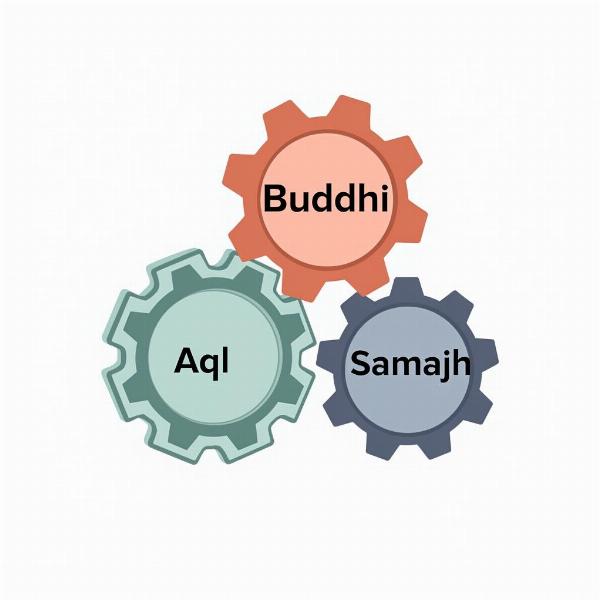The search for “wits meaning in Hindi” often stems from a desire to understand the nuances of intelligence, humor, and resourcefulness. This article delves into the various Hindi translations of “wits,” exploring their cultural contexts and providing practical examples to illustrate their usage. We’ll also examine related idioms and expressions that showcase the richness and depth of the Hindi language when discussing intelligence and quick thinking.
Different Shades of “Wits” in Hindi
“Wits” doesn’t have a single, perfect equivalent in Hindi. Its meaning depends on the context, encompassing intelligence, humor, quick thinking, and even sanity. Here are some common Hindi translations:
- बुद्धि (Buddhi): This is the most common translation and refers to intellect, understanding, and wisdom. It’s a broad term encompassing cognitive abilities and the capacity for reasoning.
- अक्ल (Aql): This word signifies intelligence, sense, and wisdom, often with a connotation of practical intelligence or street smarts.
- समझ (Samajh): This translates to understanding, comprehension, and discernment. It emphasizes the ability to grasp a situation and react appropriately.
- होश (Hosh): This refers to senses, consciousness, and awareness. It’s often used in the context of losing one’s wits, as in “बेहोश होना (behosh hona)” meaning to faint or become unconscious.
- सुझबुझ (Sujh Bujh): This term denotes good sense, discretion, and judgment. It highlights the ability to make wise decisions and navigate complex situations effectively.
 Understanding "Wits" in Hindi: Buddhi, Aql, and Samajh
Understanding "Wits" in Hindi: Buddhi, Aql, and Samajh
Using “Wits” in Everyday Hindi Conversations
Understanding the different shades of meaning allows for more accurate and nuanced communication. For example:
- “उसकी बुद्धि बहुत तेज है” (Uski buddhi bahut tej hai): “His/Her intellect is very sharp.” This emphasizes intellectual prowess.
- “मुझे अपनी अक्ल पर भरोसा है” (Mujhe apni aql par bharosa hai): “I trust my own judgment.” This highlights practical intelligence and self-reliance.
- “उसे बात समझ में आ गई” (Use baat samajh mein aa gayi): “He/She understood the matter.” This focuses on comprehension and understanding.
Idioms and Expressions Related to “Wits”
Hindi is rich in idioms and expressions related to intelligence and quick thinking. Some examples include:
- “अक्ल का अंधा” (Aql ka andha): “Blind with lack of intelligence,” meaning foolish or lacking common sense.
- “होश उड़ जाना” (Hosh udd jana): “Wits flying away,” meaning to be shocked or stunned.
- “दिमाग लगाना” (Dimag lagana): “To apply one’s mind,” meaning to think carefully about something.
At One’s Wits’ End Meaning in Hindi
The phrase “at one’s wits’ end” translates to “हद से ज़्यादा परेशान” (had se zyada pareshan) or “बुद्धि भ्रष्ट होना” (buddhi bhrasht hona) in Hindi, signifying extreme distress and a feeling of helplessness.
Conclusion: Mastering the Nuances of “Wits”
Understanding the various Hindi translations of “wits” unlocks a deeper appreciation for the language and its cultural nuances. Whether you’re describing intelligence, humor, or resourcefulness, selecting the appropriate term enriches your communication and demonstrates a nuanced grasp of Hindi. By exploring idioms and related expressions, you can further refine your understanding and effectively convey the complexities of “wits” in Hindi. For more insights into Hindi translations and linguistic nuances, explore other articles on Meaning-Hindi.in like meaning of wits in hindi, at one's wits end meaning in hindi, what is the hindi meaning of escape, and bluffmaster meaning in hindi.
FAQ:
- What is the most common Hindi translation for “wits”? Buddhi (बुद्धि) is the most common and general term for “wits” in Hindi.
- How do I say “losing my wits” in Hindi? You can say “होश खोना” (hosh khona) or “बेहोश होना” (behosh hona).
- What is the difference between “buddhi” and “aql”? While both refer to intelligence, “buddhi” is more about intellect and wisdom, while “aql” leans towards practical intelligence and street smarts.
- Is there a Hindi idiom for “quick-witted”? While there isn’t a direct equivalent, you could use phrases like “तेज बुद्धि” (tej buddhi) or “चुस्त दिमाग” (chust dimag).
- Where can I find more resources on Hindi translations? You can explore resources like dictionaries, online language learning platforms, and websites like Meaning-Hindi.in.
- How do I use “sujh bujh” in a sentence? An example would be: “उसने बड़ी सुझबुझ से काम किया” (Usne badi sujh bujh se kaam kiya) – “He/She worked with great discretion.”
- What does “paheli” mean in Hindi? paheli meaning in hindi means riddle or puzzle.
Meaning-Hindi.in is your one-stop solution for all your Hindi translation needs. We offer a wide range of professional translation services, including business and commercial document translation, certified and legal document translation, technical and user manual translation, website and localization services, educational and academic document translation, express translation, and specialized translations. We are committed to providing accurate, culturally sensitive, and high-quality translations to bridge the communication gap between languages. Contact us today at [email protected] or +91 11-4502-7584. Meaning-Hindi.in is here to help you connect with the world through the power of language.